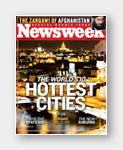 Newsweek International Edition has a special report on the world's most recent urban trends, titled the World's 10 Hottest Cities. The report puts the current buzz of "more than half of the world's population live in urban areas" into more solid & balanced context .
Newsweek International Edition has a special report on the world's most recent urban trends, titled the World's 10 Hottest Cities. The report puts the current buzz of "more than half of the world's population live in urban areas" into more solid & balanced context .The report's introduction, Unlikely Boomtowns, argues that the biggest waves of people will no longer be moving towards the world's biggest cities (New York, Tokyo, Mexico City, etc), but to "second cities." It is THESE dynamic "second cities" which will be "hot" in the coming years: Fukuoka, Toulouse, Ghaziabad, Nanchang, etc. So be on the lookout for them.
Another interesting article says that even birds, animals, and plants are moving into cities! With the current rate of deforestation, pesticide usage, and monoculture, more squirrels are to be found per kilometer square in urban areas than in rural areas.
In another article, Richard Florida, author of The Rise of the Creative Class and The Flight of the Creative Class, reminds us that it's not cities, nor nations, that are growing, but rather urban corridors - or regions.
The special report features a score of other interesting articles.
 technorati tags: cities, urban, regionalism, geography
technorati tags: cities, urban, regionalism, geography
Hey, I just came across this blog today. The Newsweek articles were quite interesting, although they don't address issues of gentrification and the distribution of benefits from the current and projected growth trends in cities. But that's more a comment for Newsweek, I guess.
ReplyDeleteAnyway, I look forward to exploring your blog and the resources you've catalogued...it looks like there's some great stuff there!
Hi Rishi,
ReplyDeleteThanks for your comment. What you've pointed out are truly valid. The processes being explained by Newsweek are insights as to how capitalism operates on cities/regions. But as a Marxist-geographer professor I had in UCLA said, "there will always be slums".
Hey, it's really cool that you're associated with Citizenshift. I was interviewed by your colleague for the WUF videoblog. Too bad we didn't meet. You can search Mulya Amri (my full name) there.